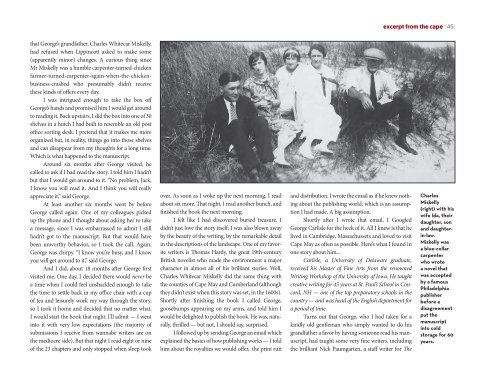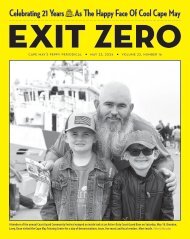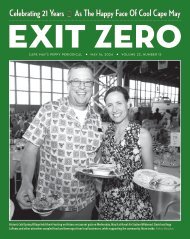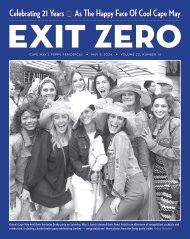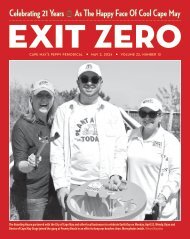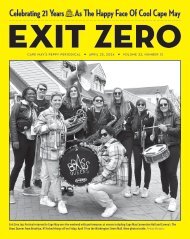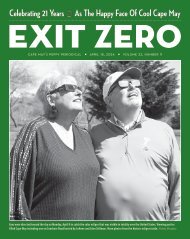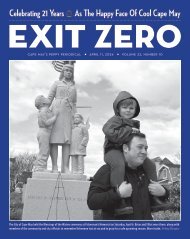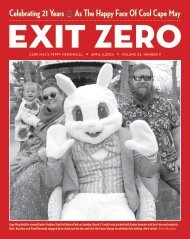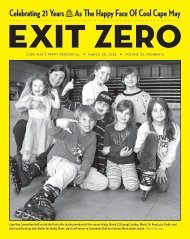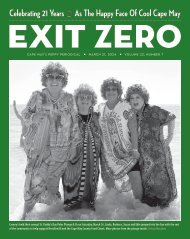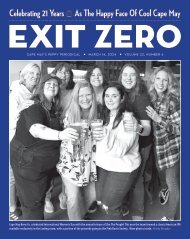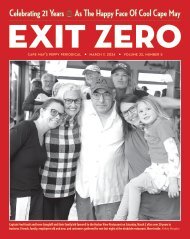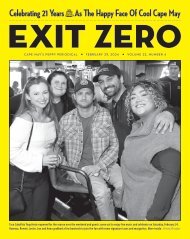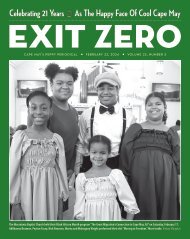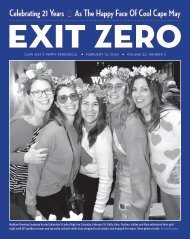Cool Cape May 2021-22
You also want an ePaper? Increase the reach of your titles
YUMPU automatically turns print PDFs into web optimized ePapers that Google loves.
excerpt from the cape [45]<br />
that George’s grandfather, Charles Whitecar Miskelly,<br />
had refused when Lippincott asked to make some<br />
(apparently minor) changes. A curious thing since<br />
Mr Miskelly was a humble carpenter-turned-chicken<br />
farmer-turned-carpenter-again-when-the-chickenbusiness-crashed<br />
who presumably didn’t receive<br />
these kinds of offers every day.<br />
I was intrigued enough to take the box off<br />
George’s hands and promised him I would get around<br />
to reading it. Back upstairs, I slid the box into one of 30<br />
shelves in a hutch I had built to resemble an old post<br />
office sorting desk. I pretend that it makes me more<br />
organized but, in reality, things go into those shelves<br />
and can disappear from my thoughts for a long time.<br />
Which is what happened to the manuscript.<br />
Around six months after George visited, he<br />
called to ask if I had read the story. I told him I hadn’t<br />
but that I would get around to it. “No problem, Jack,<br />
I know you will read it. And I think you will really<br />
appreciate it,” said George.<br />
At least another six months went by before<br />
George called again. One of my colleagues picked<br />
up the phone and I thought about asking her to take<br />
a message, since I was embarrassed to admit I still<br />
hadn’t got to the manuscript. But that would have<br />
been unworthy behavior, so I took the call. Again,<br />
George was chirpy. “I know you’re busy, and I know<br />
you will get around to it,” said George.<br />
And I did, about 18 months after George first<br />
visited me. One day, I decided there would never be<br />
a time when I could feel unshackled enough to take<br />
the time to settle back in my office chair with a cup<br />
of tea and leisurely work my way through the story,<br />
so I took it home and decided that no matter what,<br />
I would start the book that night. I’ll admit — I went<br />
into it with very low expectations (the majority of<br />
submissions I receive from wannabe writers are on<br />
the mediocre side). But that night I read eight or nine<br />
of the 23 chapters and only stopped when sleep took<br />
over. As soon as I woke up the next morning, I read<br />
about six more. That night, I read another bunch, and<br />
finished the book the next morning.<br />
I felt like I had discovered buried treasure. I<br />
didn’t just love the story itself; I was also blown away<br />
by the beauty of the writing, by the remarkable detail<br />
in the descriptions of the landscape. One of my favorite<br />
writers is Thomas Hardy, the great 19th-century<br />
British novelist who made the environment a major<br />
character in almost all of his brilliant stories. Well,<br />
Charles Whitecar Miskelly did the same thing with<br />
the counties of <strong>Cape</strong> <strong>May</strong> and Cumberland (although<br />
they didn’t exist when this story was set, in the 1600s).<br />
Shortly after finishing the book I called George,<br />
goosebumps appearing on my arms, and told him I<br />
would be delighted to publish the book. He was, naturally,<br />
thrilled — but not, I should say, surprised.<br />
I followed up by sending George an email which<br />
explained the basics of how publishing works — I told<br />
him about the royalties we would offer, the print run<br />
and distribution. I wrote the email as if he knew nothing<br />
about the publishing world, which is an assumption<br />
I had made. A big assumption.<br />
Shortly after I wrote that email, I Googled<br />
George Carlisle for the heck of it. All I knew is that he<br />
lived in Cambridge, Massachussets and loved to visit<br />
<strong>Cape</strong> <strong>May</strong> as often as possible. Here’s what I found in<br />
one story about him...<br />
Carlisle, a University of Delaware graduate,<br />
received his Master of Fine Arts from the renowned<br />
Writing Workshop of the University of Iowa. He taught<br />
creative writing for 45 years at St. Paul’s School in Concord,<br />
NH — one of the top preparatory schools in the<br />
country — and was head of the English department for<br />
a period of time.<br />
Turns out that George, who I had taken for a<br />
kindly old gentleman who simply wanted to do his<br />
grandfather a favor by having someone read his manuscript,<br />
had taught some very fine writers, including<br />
the brilliant Nick Paumgarten, a staff writer for The<br />
Charles<br />
Miskelly<br />
(right) with his<br />
wife Ida, their<br />
daughter, son<br />
and daughterin-law.<br />
Miskelly was<br />
a blue-collar<br />
carpenter<br />
who wrote<br />
a novel that<br />
was accepted<br />
by a famous<br />
Philadelphia<br />
publisher<br />
before a<br />
disagreement<br />
put the<br />
manuscript<br />
into cold<br />
storage for 60<br />
years.


